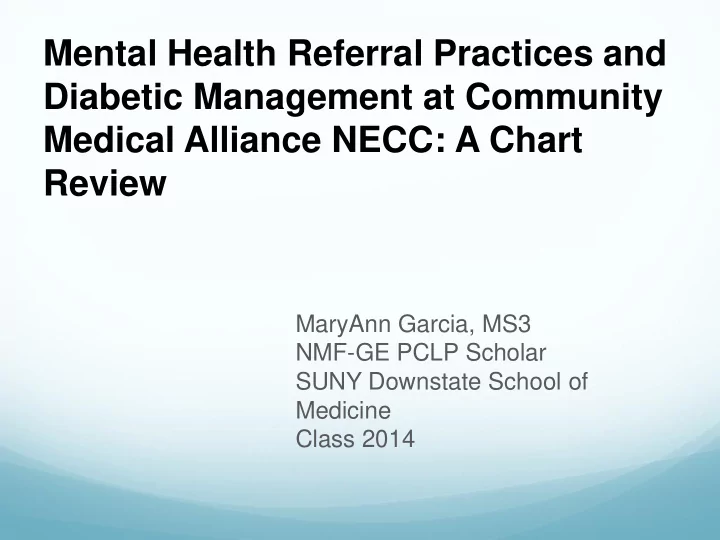

Mental Health Referral Practices and Diabetic Management at Community Medical Alliance NECC: A Chart Review MaryAnn Garcia, MS3 NMF-GE PCLP Scholar SUNY Downstate School of Medicine Class 2014
Introduction-Who am I? • Hometown: Yonkers, NY • SUNY Downstate, MS3 o Graduate of Sophie Davis which is a combined 7 year B.S/M.D program at The City College of New York. Focused on Primary Care, contractual agreement to work in an underserved community. • Academic Interest Recruitment and Retention of Minority student in higher o education, especially medical school Management of chronic conditions and role of primary o care providers
Introduction- Why this project? • Personal interest in management of chronic condition in primary care setting: Mental Health and Type II Diabetes • Provider request • Potential to motivate providers to provide aggressive treatment for mental health, especially in diabetic cohort • Provide evidence for the need to develop a support group for diabetic patients
Objectives/Purpose • Identify referral practices for patients with a diagnosis of Depression and/or Anxiety • Assess diabetic management in subset of patients with type II diabetes and comorbid anxiety or depression through Hb A1c
Methodology • Chart Review of 75 medical charts from patients with a diagnosis of Depression and Anxiety who visited the clinic in past 12 months • Information was recorded on data collection sheets, then coded and processed using Microsoft excel.
Results(1) Distrubution of Mental Health Condition in charts reviewed Depression and Anxiety 29% Depression 50% Anxiety 21%
Results (2) Referral Practices for patients with Referral Practices for patients Depression with Anxiety Deferred Referral Deferred 13% Referral Referred to 25% Referred to Mental Health Mental Health 31% Not Referred to 57% Mental Health 30% Not Referred to Mental Health 44% Referral Practices for patients with Depression and Anxiety Deferred Referral 21% Referred to Mental Health 54% Not Referred to Mental Health 25%
Results (3) Diabetic Management and Referral Practices in Cohort of Diabetic Patients Referral Average Hgb A1c: 8.10 Referred to Mental Health Not 11 (61.1%) Referred to Mental Health Not Referred to Mental 39% Referred to Mental Health Health 61% 7 (38.8%)
Discussion 70% of the time providers offer referrals for depression although 13% of these are deferred. 31.2% of the time providers offer referrals for anxiety, which is consistent with values in the literature of 37% The diabetic subset made up 24%(n=18) of the charts reviewed which is consistent with estimates in the literature.
Limitations Charts were reviewed by single reviewer. Writing in the charts may be illegible. Additional demographic information on the patient was not recorded. Small sample size
Further Research • Are patients who receive a referral getting treatment for mental health? Is it helping? • Why are some patients not being referred? provider characteristic? patient characteristics? • Intervention to increase screening and referral for diabetic patients with comorbid mental health.
Acknowledgments • GE-NMF PCLP Scholarship • NECC- Community Medical Alliance Clinic providers, MAs and referral clerks. • Dr. Lau, Executive Director • Dr. Ela Grigorian, M.D • Dr. Matthew Ho, MD-Faculty Advisor • Bernard Carrillo, PA
Recommend
More recommend